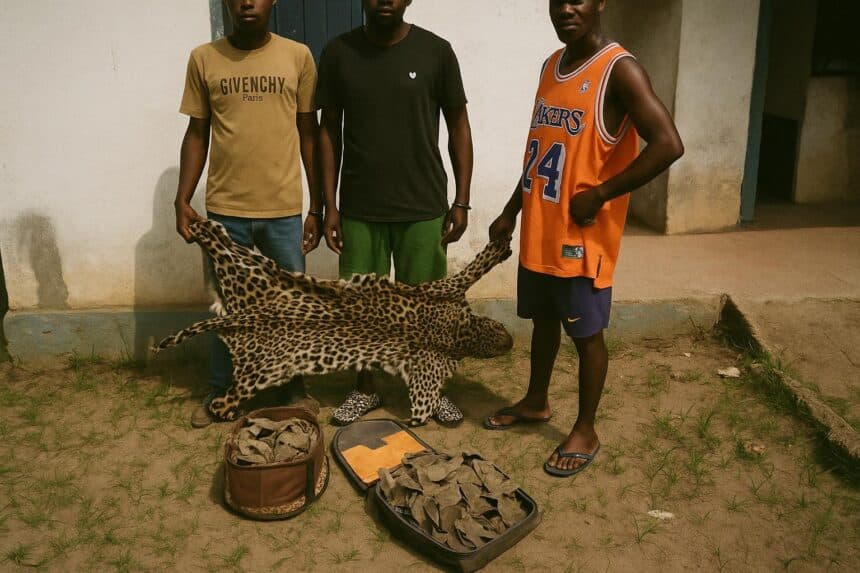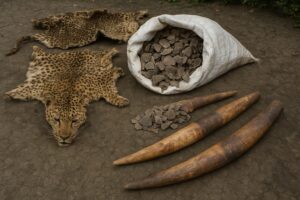Landmark Verdict in Likouala
In the steamy river port of Impfondo, capital of the Likouala Department, the Tribunal de grande instance brought the gavels down with uncommon severity on 26 June 2025. Three men—Jodel Mouanda, Arel Ebouzi and Parfait Mbekele—received sentences ranging from two to three years’ imprisonment for possessing and attempting to sell a panther hide alongside several kilogrammes of pangolin scales and claws, trophies belonging to species granted the highest level of protection under Congolese law. The court also imposed a collective fine of one million CFA francs and civil damages of three million, an amount sizeable enough to reverberate across local informal markets.
Observers note that custodial sanctions for wildlife infractions in Central Africa remain the exception rather than the rule, rendering the Impfondo ruling a jurisprudential beacon. Magistrate Paul-Auguste Ekoula justified the firmness in open court, arguing that “the gravity of the offence lies not only in the death of individual animals but in the weakening of our national heritage and of international trust”—a phrasing that quickly circulated on regional news wires.
Legal Framework and Penalties Underpinning the Case
Congo-Brazzaville’s 2008 Wildlife and Protected Areas Law, strengthened by a 2020 implementing decree, classifies both Panthera pardus and Smutsia gigantea as fully protected. Article 113 authorises penalties of up to five years’ imprisonment and fines of up to ten million CFA francs for trafficking in such species. The Impfondo bench therefore operated within a clear statutory lattice, yet its decision to hand down prison terms in the upper half of the scale indicates judicial willingness to convert textual severity into tangible deterrence (Ministry of Forest Economy, 2024).
Legal scholars point out that the ruling aligns with Brazzaville’s obligations under the Convention on International Trade in Endangered Species of Wild Fauna and Flora, whose secretariat has repeatedly urged range states to graduate from administrative sanctions to criminal convictions (CITES Secretariat, 2023). By translating treaty rhetoric into courtroom practice, the Congolese judiciary sends a calibrated signal both to poachers and to foreign partners financing conservation initiatives.
Enforcement Architecture on the Ground
The arrests unfolded through a joint operation by the Likouala gendarmerie, forestry inspectors and the locally embedded team of the Project for the Application of Wildlife Law (PALF). According to Captain Franck Ossiala, head of the Impfondo gendarmerie post, the sting relied on “weeks of discreet market surveillance and the controlled use of informants”, illustrating the maturation of intelligence-led policing in a region once characterised by vast, unmapped forest corridors.
PALF’s technical support, funded in part by multilateral conservation donors, provided forensic training that allowed officers to verify the authenticity of the seized scales on site, reducing the opportunities for evidentiary challenges in court. Such coordination mirrors the National Anti-Poaching Strategy adopted in 2022, which created inter-agency wildlife crime task forces in all twelve departments (World Bank, 2023).
Regional Implications for Conservation Diplomacy
Central Africa remains a pivotal node in the transcontinental trade linking forest ecosystems to high-value consumer markets in Asia and the Gulf. The seizure of pangolin derivatives in Impfondo, a town hugging the Oubangui River that forms the border with the Democratic Republic of Congo, underscores the permeability of frontiers in a basin where waterways function as both lifelines and escape routes. The Congolese verdict therefore carries weight for neighbouring administrations attempting to harmonise enforcement standards under the auspices of the Central African Forest Commission (COMIFAC).
Jean-Marie Okouma, a regional coordinator at the African Union’s Wildlife Strategy unit, notes that “credible prosecutions in one capital empower prosecutors in another; they create a jurisprudential domino effect”. In recent diplomatic correspondence seen by this publication, Brazzaville’s Foreign Ministry flagged the Impfondo case as evidence of compliance during preparations for the forthcoming Global Biodiversity Framework stock-take in Nairobi.
Balancing Livelihoods and Biodiversity
While conservationists applaud the sentencing, socio-economic considerations remain acute. Likouala’s forest-fringe communities earn an average annual income below 600 US dollars, and bush-meat sales still represent a subsistence safety net (African Development Bank, 2024). Officials therefore face the delicate task of maintaining deterrence without alienating populations whose cooperation is indispensable for intelligence gathering.
The Ministry of Forest Economy has recently expanded alternative-livelihood programmes—ranging from agro-forestry training to small-scale aquaculture—aimed at reducing reliance on wildlife extraction. Early monitoring suggests a modest but discernible decline in poaching incidents within pilot villages. Yet, as sociologist Clarisse Ndinga cautions, “behavioural change seldom outpaces market demand”. Hence, legal firmness, such as displayed in Impfondo, must operate in tandem with economic inclusion if Congo is to safeguard its biodiverse patrimony while nurturing social cohesion.
For now, the Likouala verdict offers a case study in how local courts, empowered by updated statutes and emboldened by inter-agency cooperation, can tilt the calculus of risk for would-be traffickers. Whether that tilt endures will depend on sustained political commitment, predictable funding streams, and the gradual weaving of conservation incentives into the fabric of daily rural life.




















